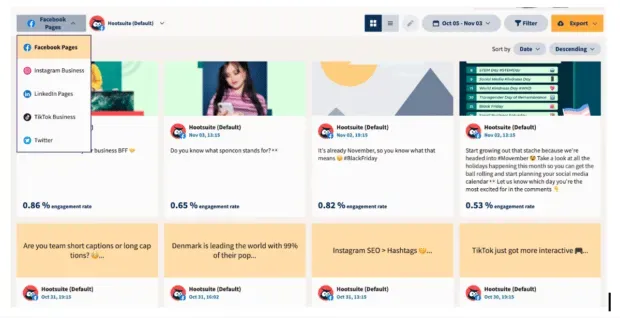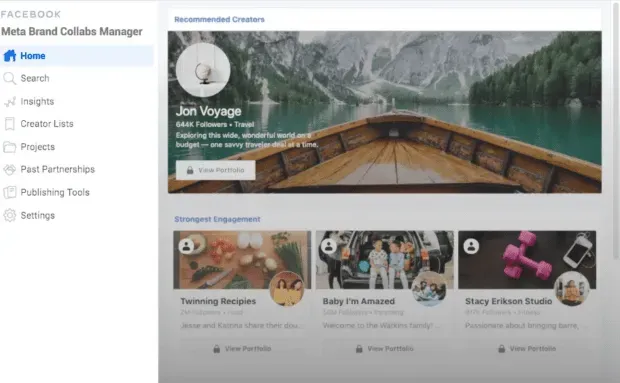Two heads are better than one, right? This is the idea of collaboration in social networks. When brands team up with other brands and influencers to reach new audiences, it can be a win for everyone.
But for your collaboration to be successful, you need to consider some key points before you get started. Below is a step by step guide to help you achieve the perfect social media collaboration.
Social media collaboration is when two or more brands come together to create content that is shared on their respective social networks. This could be sponsored posts, giveaways, or other content that taps into each partner’s audience.
Social media collaborations can increase reach and engagement, increase brand awareness, create valuable partnerships, and drive sales. It’s also a great way to build relationships with other brands and expand your customer base.
If you want to capitalize on the benefits of social media collaboration, here are a few tips to keep in mind.
1. Choose the type of cooperation
Before you start planning social media collaborations, it’s important to decide what kind of partnership you want. Do you want a permanent alliance or a one-time event? Will the partnership involve product giveaways, co-creation of content, or something else?
Setting expectations helps ensure that you and the other party are on the same wavelength. It also helps you clarify who is responsible for which tasks as you work together.
We recommend making clear contracts at the beginning of your cooperation. Your social media collaboration contracts should, at a minimum, include the following:
- Detailed list of results from both sides
- Deadlines for each task to be met
- Responsibilities of each party (what do you assume?)
- Compensation package and payment terms
- Ownership of intellectual property and content
- Contingency plans in case of project failure
- Availability and language requirements
2. Collaborate with relevant authors
Collaboration in social networks is aimed at expanding the reach and attracting new customers. That’s why it’s so important to partner with a brand that introduces you to a new audience, but that cares about your product or service.
Finding the right influencer for your social media campaign is key. Look for someone who communicates with the target audience you want to reach and has enough credibility to convince them.
The influencer should also have enough followers to change your reach, but not so much that you get lost in the crowd.
Smart collaboration may include:
- Shoe brand collaborates with fashion blogger
- A health food company that works with a nutritionist or nutritionist.
- A sportswear brand that collaborates with an athlete or fitness enthusiast.
- A video game company partnering with a popular YouTube or Twitch streamer.
The key is to find creative ways to collaborate that will draw attention to your brand and give subscribers something of real value, such as exclusive discount codes, content, or a unique entertainment experience.
@jamworth Cheese Puffer Jacket 😜 #cheetos #fashion #funny #flaminhot #teashirt
3. Agree on a primary goal
Goals are important to any social media strategy, but they are even more important to collaboration.
Before you and your employee start brainstorming ideas and creating content, you must agree on a primary goal that can be tracked and measured. It should be something tangible, like driving traffic to a particular product page or increasing sales of a product featured in your collaboration.
Try to avoid less quantifiable goals like “get more followers”. It’s easy to mistake an increase in subscribers for success, but there’s no way to measure how much value these additional subscribers add.
Use social media collaboration tools to reach your goals. Social media and online collaboration tools are invaluable for keeping track of projects, organizing, and tracking progress. With the right tool, you can store all your assets in one place for ease of use, create metrics-based collaboration performance reports, and share your progress and results with colleagues.
@meghantrainor A special @elfyeah radiance report: It’s an ELFING GLOW STORM! Please exercise ✨extreme iridescence!✨ (and thank you @weatherchannel for inspiring the glowcast!)🤍 #elfpartner
4. Develop a Framework for Collaboration
Setting tight deadlines, clear expectations, and clear goals should be a priority when collaborating on social media. The more direct and detailed you are, the more effective and successful your collaboration will be. This is especially important when working with multiple partners or over a longer period of time.
In order to maintain the success of a collaboration, it is important to regularly check and maintain good communication. Schedule regular meetings with both parties to discuss progress and goals, resolve any issues that arise, and set new goals.
5. Choose Social Media Collaboration Tools
Apart from a solid contract, you should consider investing in social media collaboration tools to make the process a smooth one for all parties involved.
These tools make it easy to manage your campaign by allowing multiple members of the social media team to access and contribute at any time. It also helps streamline communication between all stakeholders (including influencers and partners) for a seamless workflow.
Tools like Hootsuite for social media scheduling, Trello or Monday for project management, and Asana for task management can make collaboration between team members a lot easier. They also provide a centralized platform for tracking progress and keeping all necessary assets in an accessible location.
Also, consider how you plan to track the success of your social media collaborations. Using UTM tracking codes and hashtags for campaigns or events, and sharing analytics and information will help you see what’s working in your collaboration. Tools like Hootsuite Analytics can help you track the success of every element of your collaborative campaigns.
Finally, make sure that all collaborators understand their roles and responsibilities. Using tools like Slack or Microsoft Teams can make communication easier and ensure everyone is on the same page.
6. Share your style guide on social media
Your social media style guide is the essence of your brand. Not only does it explain how you want your brand to be represented in their interactions, but it also lays the groundwork for how your collaboration will work.
Before starting your campaign, share and explain your style guide to all brand employees and partners. You want to make sure that any new content you create together is up to your brand standards.
Keep in mind that your collaborator will also have their own style guide and requirements for the content they create. Review them together and develop a unified approach for how the two brands will work together in terms of visuals, content, and the like.
The best social media collaboration combines the best of both brands, so don’t be afraid to make adjustments and compromises to create a unified look.
7. Consider the emotional aspect of your campaign
Once you and your collaborator have agreed on terms, it’s time to get creative. Consider how you can use your social collaboration to create an emotional connection with your audience.
This could include donating some of the profits to a charity, highlighting a cause you both care about, or simply creating content that will make people smile and connect with it on a deeper level.
If you’re working with an influencer, ask them to create content that speaks to their values and resonates with their audience. Similarly, if the collaboration involves co-creating a product or service, focus on how it can solve your customers’ problem in a unique way.
Remember that social media collaboration can be more than just marketing. It’s also a great way to do something meaningful while strengthening the connections you make with your clients. With the right mix of content, creativity, and collaboration tools, you can turn this into a great opportunity for everyone involved.
@spotify #SpotifyEQUAL artist #SilvanaEstrada values the company of fellow women musicians and is inspired by her peers and predecessors 💚 Listen to her music on the EQUAL playlist #womeninmusic
8. Decide when, where and what you will post
Timing is everything when it comes to social media content. Not only do you need to choose the platform and type of content, but you also need to correctly calculate the publication time.
Think about any holidays, trending topics, or special events that might coincide with your post. Also, pick a time when you know your followers are most likely to see your content and optimize for each platform.
You can also use platform information to find out what content your audience is interested in right now and how they want you to connect with them. Your followers may be more interested in Instagram stories than static images. Or they are more active on TikTok these days. Your research will help create a calendar of content that will resonate with your audience.
It’s also a good idea to ask your collaborator to contribute. You are not only talking to your audience, but to theirs as well. Compare your ideas and find a middle ground that benefits both parties equally.
9. Reveal all partnerships
Disclosing partnerships is a must, especially when it comes to social media collaborations. Your audience should always know when a post was sponsored or created in collaboration with someone else.
Not only is this legally required by the Federal Trade Commission (FTC) and other regulators around the world, but it also helps build trust between you, your employee, and your audience. Users tend to appreciate it when companies are transparent about their collaborations.
Be sure to accurately tag all sponsored posts so users know the collaboration has taken place. Use hashtags like #ad and #sponsored, or if you’re on Instagram or TikTok, use the Paid Affiliate tag in your post title. And don’t forget to include a written and verbal disclosure of the partnership in the video itself, not just a description.
@khaby.lame Who wants to ⚡️go⚡️to McDonald’s with me after the game today? #ad @mcdonalds
10. Cross promote your content
One of the biggest benefits of social media collaboration is the ability to engage with existing audiences. But keep in mind that both of you will need to promote content on your channels in order to be successful.
This means that you will need an effective cross-promotion plan. Coordinate with other partners to determine who will publish what content and when each post should be published. Don’t forget to add links to each other’s social media profiles, websites, and other content you’ve created for collaboration.
It’s also wise to announce your collaboration ahead of time so your audience gets excited about what’s coming next.
Want to know how to announce a collaboration on social media?
Social media users often value personal contact. If you have multiple influencers and brands, consider having them post a partnership announcement on their accounts.
You can also create a unique hashtag that includes the names of both parties. This will help make your collaboration more visible.
11. Share the results with a colleague
Finally, share the results of your cooperation with any participants or partners. The data you collect can be invaluable to both your digital marketing efforts and those of your employees. It will also help inform future collaborations and social media strategies.
The best way to share this information is to create a comprehensive report that describes how the collaboration went, what key metrics were achieved, and how the content resonated with the audience. Metrics such as reach, engagement, conversion rate, and mood can be tracked and reported to provide a more holistic view of collaboration success.
Social media collaboration tools help you create detailed reports, track performance, and uncover key insights.
Let these examples of social media collaboration inspire you to create and launch your own collaborative campaigns.
Charli D’amelio x Takis
Charlie D’amelio is one of the biggest names on TikTok with over 149 million followers. For this social media marketing collaboration, she teamed up with snack food company Takis to create a short TikTok video of her spending movie nights. The video has gained more than 2.6 million views and 10.5 thousand reposts.
@charlidamelio movie night @Takis #takispartner
Bella Poarch x Hugo Boss
Sometimes brand partnerships happen offline as well (crazy, we know). When TikTok influencer Bella Poarch was asked to take part in the Hugo Boss fashion show, both brands knew it was the perfect opportunity to create buzz on TikTok. This social media collaboration is a perfect example of how online and offline tactics can work together.
@bellapoarch I don’t think I met the height requirement😅 @BOSS #BeYourOwnBOSS #ad
Shaq x Papa Johns
Creative hashtags are a great way to organically increase the reach of collaborative posts.
NBA legend Shaquille O’Neal and Papa John’s launched the #Shaqaroni TikTok challenge, in which users were invited to videotape themselves dancing to Shaq’s “Shaq-a-Roni”and use the hashtag #Shaqaroni. Shaq then responded to the funny and touching entries in a series of TikTok duets.
This campaign is a great example of how humor and creativity can greatly expand the reach of your message.
@shaq #duet with @karaleighcannella #shaqaroni Ayyye #🍕ole girl was hittin that #shaqaroni dance. i got $$ for the best duet
Yeti x Traeger Grills
Social collaboration happens between brands as well. This year, outdoor brands Yeti and Traeger Grills have teamed up to launch a unique promotion. Both companies asked fans to share images of their BBQ with the hashtag #YETIxTraegerBBQ to win a joint prize package. This partnership was successful and over 1,000 entries were submitted for the competition.
Ready to start? Learn how to use social media platforms for collaboration and collaboration.
1. Analytics Hootsuite

Hootsuite Analytics is a great tool for managing and analyzing social collaboration. It offers detailed information about campaign performance, including impressions, engagement, and reach. You can even compare your performance against industry standards.
You’ll also have access to a full suite of reporting tools to share with influencers throughout your campaign. Use it to track conversations, track engagement with your and your influencers’ posts, and optimize your campaigns for maximum success.
2. Collaborations on Instagram
Collaborative posts on Instagram allow you to reach an even wider audience by combining the power of two accounts. One user creates a post and invites another to be listed as a contributor. Once accepted, the message appears under both user accounts.
This feature can help you get more exposure for your brand or campaign by appearing in two places at the same time. As a bonus, both accounts will receive the same comments, likes and number of reposts. Collaborative social media posts are a great way to increase reach, engagement, and followers.
3. Facebook Brand Relationship Manager

Facebook Brand Collabs Manager is a tool that makes it easy for brands to connect with the right creators on Facebook and Instagram. This platform allows businesses to search for users with the most relevant followers, interests, and content. Brands can then reach out directly to those they think are great for their campaigns.
The tool also helps ensure that any messages sent by brands to creators are not lost or ignored. Brand Collabs Manager provides an easy way for brands and creators to get together, eliminating the need to spend hours searching for collaborative projects one by one.


